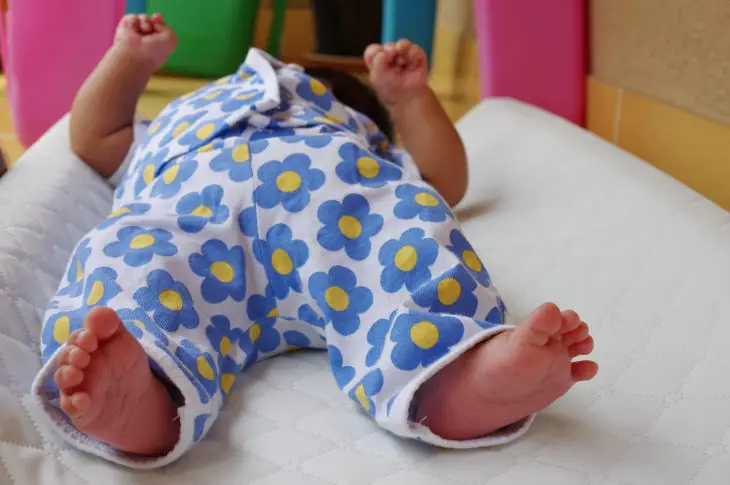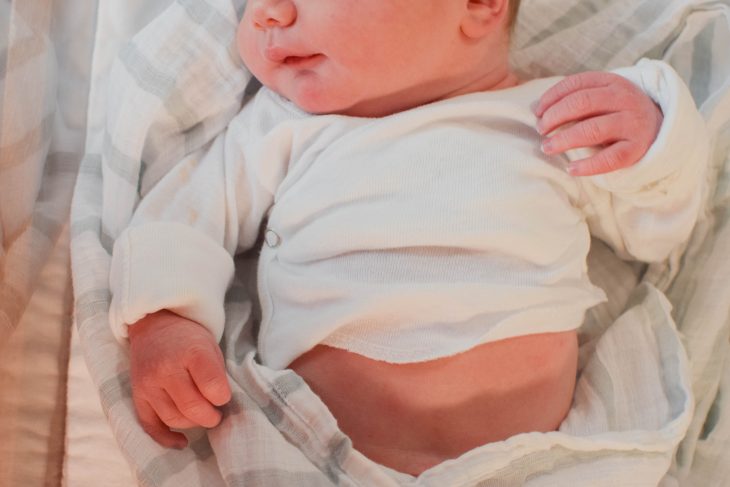If you notice your newborn farts smell, you aren’t alone. Countless parents are holding their noses while cradling their stinky little angels because newborns fart–a lot! But when does farting go from cute to worrisome? And why does newborn gas smell so bad, anyway? Join us to find out in today’s article.

Should Newborns Have Smelly Gas?
Yes, totally!
Just like adults, newborn gas is simply a fact of life. Unlike grown-ups, newborns have no means of holding their gas in to be “polite”.
Thus, out it rolls with all sorts of fun noises accompanying it!
Is It Normal For My Newborn Farts to Smell?
Yes, it is normal for newborn farts to smell.
In fact, some infant gas may even take on a sulfuric smell similar to that of rotten eggs. Nevertheless, most of this stink is totally normal.
Still, it can help to know the science behind why babies are so gassy. Let’s take a peek at a few of those reasons now!

Why Does My Newborn’s Farts Smell So Bad?
Newborn farts can pack quite a punch. But there are varying reasons as to why this is the case.
Reasons for strong-smelling newborn farts include the following.
Immature Digestive System
When babies are born, their digestive system takes a while to mature and grow. Because of this, babies can have a difficult time handling what goes into their stomachs, even if it’s something beneficial like breast milk. Rather than pass it off as odd, it is important to realize that most babies are gassy no matter what they consume. This usually is due to their immature digestive systems.
The key to minimizing the amount of gas produced by your baby in this case is to wait it out. Your baby will eventually grow out of this extremely farty phase–at least, we hope!
Baby Formula
You‘ve probably heard the phrase “breast is best’ often and for good reason. Breast milk is the number one nutritive source of nutrition for babies. Still, if there are reasons you must choose formula over breast milk, know that flatulence experienced by your baby may abound.
The reason that formula-fed babies may experience more gas than breastfed babies typically is tied to the milk proteins found in baby formula. Because most baby formula is made with cow’s milk, both casein and whey (the proteins found in milk) can make it harder to digest. Because of this, you may notice your baby become fussier and gassier upon taking the milk.
Note: If this worries you, be sure to stick around until the end. We’ll be sharing our recommendations on what you can do to relieve fussiness connected to formula feeding.
Intolerances
Similar to the aforementioned point, babies can often have intolerances to additives or natural compounds found in baby formula. Intolerances can come in many forms, so be sure to see a doctor if you suspect that this could be an underlying cause of your baby’s stubborn gas.
Note: Breastfed babies can also experience an upset tummy based on what mom has eaten. Although formal analysis doesn’t show a strong correlation between a mom’s diet and a baby’s reaction to her breast milk, persistent anecdotal claims of mothers from around the globe seem to hint that there could be a connection.
To be safe, you may wish to steer clear of gas-causing foods including cabbage, beans, broccoli, cheese, and cheese. If avoidance of one or all of these foods seems to help ease your breastfed baby’s tummy woes, it’s safe to say that your diet may have been to blame.
Sucking in Air
Whether your baby is feeding at the breast or is feeding from the bottle, it is always a possibility that your baby is gulping too much air. This can happen if your baby becomes voraciously hungry and eats too fast. It can also happen if your baby is crying while feeding or doesn’t have a good latch.
In either case, swallowing too much air causes your baby a lot of discomfort. To help, be sure not to allow your baby to become too hungry between feeds. Also, always ensure a proper latch to the bottle or breast and comfort your baby before attempting to feed them if they are crying.

Why Does My Newborn Farts Smell Like Rotten Eggs
So, you know why newborn farts smell bad, but what about when they really reek?
If your baby’s farts smell like rotten eggs, it may be for the reasons listed above or it could be something else.
To know for sure why newborn farts smell like rotten eggs, speak with your doctor.
Newborn Farts Smell Like Sulfur
Sometimes, sulfur-smelling flatulence may be related to dairy intolerance, infection, or poor absorption of nutrients.
Thus, speaking with your doctor is the best way to be sure there aren’t serious underlying causes of the offensive odor.

Baby’s Farts Smell Bad: How Can I Fix It?
Now that you know why newborn farts smell terrible, you may be wondering what you can do to fix it. Of course, there is no sure way to eliminate newborn gas completely.
But there are a few tips and tricks you can utilize to help make bub a bit more comfortable.
Newborn Farts Smell Really Bad: Our Best Remedies
Baby has smelly gas but no poop? No problem!
Here are our best remedies to help deal with a baby’s farts that stink:
Wait it Out
Remember that your baby’s digestive system is very immature. That means that he or she will likely have trouble processing both formula and breastmilk for a while.
Wait it out before you jump to conclusions. Babies often get better in this aspect at around the 6-month mark.
Switch It Up
Think your baby’s formula might be the cause of excessive baby farts? It may be time to try a different brand.
Some babies tolerate other brands or formula types better than others. Some formulas, like Similac Total Comfort are designed to provide your baby with gas relief.
Still, be sure to speak with your doctor before switching up the formula, and be careful not to switch too often. Too many changes to a baby’s diet will do more harm than good. Your doctor will give you tailored advice about what to try and when.
Watch What You Eat
Although not scientifically proven, many mamas have made the claim that certain foods have caused their baby gas via breast milk.
If you’re breastfed baby’s gas just won’t let up, consider switching up your diet a bit to see if that gives your baby some relief.
Get a Good Latch
Remember that babies that aren’t latching well to either the bottle or breast will take in excess air. This excess air ends up in their tummies.
Thus, it is important that your baby has a great latch to ensure that he or she stays comfortable
Buy the Right Nipple
Similar to sucking in too much air, a baby may experience discomfort if he or she is receiving too much milk at once. This typically happens when you’ve purchased the wrong nipple for a bottle. Be sure to pay attention to age-group listings on nipple package labels to ensure you are buying the best nipple for your baby’s bottle.
Watch For Additives
Some formulas contain additives that are irritating to your baby’s gut. Speak with your doctor if you have a concern about your baby’s formula. He or she may be able to point you to other formulas that may be gentler on sensitive tummies.
Test For Intolerances
In tandem with sensitivities to additives, babies can also be sensitive to milk proteins. Speak with your pediatrician if you notice your baby having excess gas and fussiness immediately after feeds. He or she can conduct the right tests to see if your baby may have allergies or sensitivities to the proteins found in milk.
Burp Often
We’re sure you already know this, but burping is vital to soothing baby gas. Be sure to burp your baby after every feed to help him or her rid themselves of excess air that gets trapped during feedings. If you don’t the excess gas could get trapped in the tummy making for terrible (and stinky) wind!

Avoid Too Much Activity After a Feed
After you feed your baby, it’s best to allow them to sit upright for at least 20-30 minutes as their meal settles. As tempting as it may be to lay your baby down or place them on a blanket for tummy time, this may only exasperate issues related to flatulence.
Instead, sit your baby upright, either in your lap, bouncer or swing, lounger, or another safe place for around half an hour.
Note: If your baby has fallen asleep during a feeding, that’s okay too. Simply cradle the baby in your arms (as upright as you can manage) until the allotted amount of time passes. Then, carefully, place him or her in their crib.
Try a Tummy Massage
Last but not least, try massaging your baby’s tummy to relieve trapped wind. There are several ways to do this, but the best way is shown in the video below. Alternatively, you can “bicycle” your child’s legs in the air as they lay on their back to provide similar relief. Either option works exceptionally well!
Baby Smelly Farts After Starting Solids
Before we close, we want to dedicate a segment to why your baby may have smelly farts after starting solids. As we’ve mentioned before, baby digestive systems tend to improve by 6 months of age. Unfortunately, this is also when your baby begins to sample table foods. The act of introducing new foods alone is enough to get his or her tummy rumbling. Thus, you aren’t out of the woods just yet!
A baby that has smelly farts after starting solids isn’t usually serious, but it can be. It can also be an indicator that your baby isn’t tolerating particular foods well. This is especially common as your baby begins to sample dairy products or sulfuric vegetables.
If, however, your baby doesn’t seem to be getting used to eating these foods over time, it may be worth it to get a second option from a healthcare professional to ensure there aren’t underlying issues going on.
Baby’s Farts Stink: Not Such a Mystery, After All…
Remember, it is totally normal for a baby’s farts to stink. In fact, you should expect it! Because babies’ digestive systems are so immature, anything that they consume can cause their tummies to rumble. The key is to ensure your baby is receiving the right kind of formula, is latching well at the breast, is burped after each feeding, and avoids rigorous activities (including tummy time) right after meals.
Other remedies for baby gas not mentioned here abound, however, we caution you to be careful what you give to your baby when he or she is young. Though it may be tempting to give them gas drops and other forms of medicine, we advise you to be careful when administering these. Only do so under the care and supervision of your doctor.
We hope this helps! Until next time!
FAQs
Do newborn farts smell? Yes, newborn farts definitely have a stench to them. This is usually normal.
This can sometimes be an indicator that something isn’t right. Check to make sure your baby isn’t allergic to additives or milk proteins found in formula before passing this off as normal.
They can! But there’s more to being a “colicky” baby than just gas.
A child of any age can have smelly farts. Sometimes, the older the child gets the smellier the farts can be! And just like adult farts, the smell of flatulence is usually connected to whatever they ate. See a doctor if the smell of your child’s fart concerns you.
The smelly gas in breastfed babies is normal. However, it can sometimes be a sign that something in your diet may be causing them trouble. Eliminate foods like potatoes, beans, carbonated drinks, and dairy to see if it helps any.

Leave a Reply